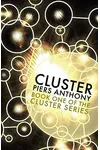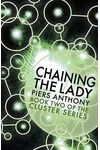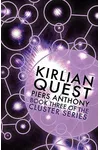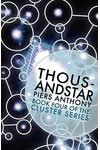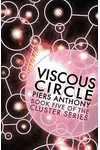Step into the cosmic adventure of the Cluster series by Piers Anthony, where interstellar intrigue and mind-bending technology collide in a vibrant science fiction saga! This captivating series whisks readers to a galaxy where humanity’s reach spans light-years, grappling with alien alliances, existential threats, and the mysteries of the Kirlian aura. With its blend of pulp-inspired action and thought-provoking themes, Cluster invites you to explore a universe both thrilling and profound.
First published in 1977, the Cluster series stands as a testament to Anthony’s boundless imagination, offering a space opera that’s as entertaining as it is ambitious. Let’s dive into its origins, stories, and lasting allure!
How Cluster Began
Piers Anthony, a prolific author known for his Xanth fantasy novels, ventured into science fiction with Cluster, inspired by his fascination with interstellar colonization and human potential. Conceived as a trilogy before expanding to five books, the series builds on Anthony’s earlier novel, But What of Earth?, set 500 years later in a galaxy shaped by matter transmission. Anthony’s goal was to craft a universe where technology and culture intertwine, challenging characters to navigate galactic crises with wit and resilience.
The Heart of Cluster
The Cluster series spans five novels, each weaving a unique tale within its shared universe. The first, Cluster (1977), introduces Flint, a green-skinned native of Outworld, who possesses a powerful Kirlian aura—a measure of one’s life force. Tasked with thwarting Galaxy Andromeda’s plan to drain the Milky Way’s energy, Flint’s mission blends espionage, diplomacy, and alien encounters, all while pursued by a deadly Andromedan assassin. Chaining the Lady (1978) follows Melody of Mintaka, Flint’s descendant, as she battles Andromedan agents using involuntary aura hosting. Kirlian Quest (1978) explores Herald the Healer’s quest to uncover ancient secrets against a massive alien fleet. Later books, Thousandstar (1980) and Viscous Circle (1982), delve into new characters and ancient sites, expanding the saga’s scope.
The series shines through its themes of cultural exchange, technological ethics, and survival. Anthony’s galaxy, centered around Sphere Sol and neighboring star-based civilizations, pulses with diverse alien species and innovative concepts like aura transfer, which allows characters to inhabit foreign bodies. While some critique the series’ pulp-style prose or controversial gender dynamics, fans praise its imaginative world-building and adventurous spirit, blending hard science fiction with fantastical elements.
Why Cluster Resonates
Cluster’s impact lies in its bold exploration of humanity’s place in the cosmos. Though less celebrated than Anthony’s Xanth series, it carved a niche among sci-fi fans for its creative take on interstellar politics and identity. Readers on platforms like Goodreads laud its “fascinating” alien cultures and “entertaining” twists, despite noting occasional narrative unevenness. The series’ blend of high-stakes action and philosophical musings continues to captivate those who seek space operas with heart and imagination.
Its legacy endures as a snapshot of 1970s science fiction, reflecting the era’s optimism about technology and exploration, tempered by warnings of cosmic hubris. For fans of classic sci-fi like Asimov or Clarke, Cluster offers a vibrant, if quirky, addition to the genre’s canon.
- About Cluster
- Publication: 1977–1982
- Books: 5 (Cluster, Chaining the Lady, Kirlian Quest, Thousandstar, Viscous Circle)
- Genre: Science Fiction, Space Opera
Ready to explore a galaxy of intrigue and adventure? Grab Cluster and blast off into Piers Anthony’s dazzling universe!
